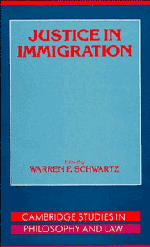Book contents
- Frontmatter
- Contents
- List of contributors
- 1 Immigration, welfare, and justice
- 2 Citizenship, the demands of justice, and the moral relevance of political borders
- 3 A two-country parable
- 4 Immigration, identity, and justice
- 5 Immigration, justice, and culture
- 6 Fear and loathing at the border
- 7 Immigration policy in liberal political theory
- 8 The welfare economics of immigration law: a theoretical survey with an analysis of U.S. policy
- 9 Just borders: normative economics and immigration law
- 10 Some caveats on the welfare economics of immigration law
- 11 The case for a liberal immigration policy
2 - Citizenship, the demands of justice, and the moral relevance of political borders
Published online by Cambridge University Press: 18 March 2010
- Frontmatter
- Contents
- List of contributors
- 1 Immigration, welfare, and justice
- 2 Citizenship, the demands of justice, and the moral relevance of political borders
- 3 A two-country parable
- 4 Immigration, identity, and justice
- 5 Immigration, justice, and culture
- 6 Fear and loathing at the border
- 7 Immigration policy in liberal political theory
- 8 The welfare economics of immigration law: a theoretical survey with an analysis of U.S. policy
- 9 Just borders: normative economics and immigration law
- 10 Some caveats on the welfare economics of immigration law
- 11 The case for a liberal immigration policy
Summary
By what standards ought the immigration policies of nations be assessed? Answering this question requires that we draw several preliminary distinctions. In the first place, immigration is a form of access to political borders. Access, in turn, can take many forms, from travel to temporary residence, to permanent residence, and, ultimately, to citizenship. Let us refer to these as various forms of status. Different countries provide different bundles of resources to individuals depending on their status. Thus we can distinguish between status, the conditions for obtaining that status, and the bundles of resources that status entitles one to. In the first part of this essay, we explore the various forms of access to political borders individuals can obtain, the conditions that must be satisfied in order to obtain them, and the bundles of resources the status makes available. Our empirical study is restricted to eight representative nation-states.
Our approach to the normative question is to see whether important aspects of the immigration policies of the nations we consider can be defended as reflecting or consistent with alternative plausible conceptions of justice. So we look first for common elements in these practices and then ask ourselves whether these can be plausibly construed as implementing an appropriate ideal or demand of justice. In other words, before suggesting reform of existing policies, we take the view that the theorist's responsibility is to try first to make the best case for existing practices. The criticisms that stick are those that emerge after a practice has received the most sympathetic understanding and found to fall short.
- Type
- Chapter
- Information
- Justice in Immigration , pp. 18 - 62Publisher: Cambridge University PressPrint publication year: 1995
- 10
- Cited by



